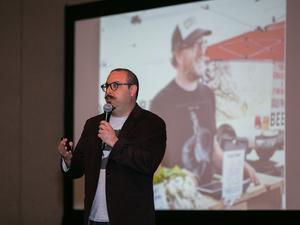
Minnesota's expertise in the food industry goes back a long time. However, a new crop of companies is helping make food — and the way food gets to your grocery store or plate — more sustainable.
Brett Brohl is a managing partner at Bread and Butter Ventures and managing director of the St. Paul-based Techstars Farm to Fork Accelerator, a food- and agriculture-focused accelerator assisted by Ecolab Inc. and Cargill Inc. Farm to Fork startups work with Ecolab and Cargill, as well as Minnesota's other food companies, to solve problems those firms can't solve themselves.
Increasingly, that problem is sustainability, Brohl said, including a focus on inefficiencies in the food supply chain. Supply chain issues can cause food to go to waste and result in unnecessary fuel use as food is moved vast distances around the country before it ends up on your plate.
Techstars alum Big Wheelbarrow is a software company that helps smaller farmers sell food directly to restaurants and grocery stores. Smaller farmers can often find it harder to get their food to customers, and when they can, the food often has to travel unnecessarily, he said.
"One of the worst-kept secrets is that food moves incredibly inefficiently in terms of mileage," said Big Wheelbarrow co-founder Sam Eder.
Co-headquartered in both Austin, Texas, and St. Paul, Big Wheelbarrow's software can reduce the distance that food travels by as much as 80%, Eder said.
There's also Otrafy, a food manufacturing management software startup that moved from Vancouver, B.C., to St. Paul because of its participation in the Farm to Fork Accelerator. Otrafy is working to digitize the hundreds of billions of paper documents created by food supply chains and make it easier to track food as it moves. It was named a 2020 Minnesota Cup finalist.
Other companies are making the food itself more sustainable. Minneapolis-based Puris Holdings is a local food-tech success story. It makes plant-based proteins and meat substitutes out of pea protein, supplying major plant-based meat companies like Beyond Meat. It has raised at least $130 million in growth capital and at least $100 million of that has come from Cargill, one of Puris' closest partners. The company recently announced a joint venture with Livekindly Collective that will turn the waste from pea protein production into even more food.
New startup Fybraworks Foods is also making meat, but it goes a step further. Based out of St. Paul's University Enterprise Labs, Fybrawork is growing protein by putting animal DNA in the genome of yeast and mushrooms then fermenting it like beer, said CEO Chenfeng Lu.
The process is cheaper than other lab-based meats, Lu added, meaning it has greater potential to scale.
Fybraworks will have an easier time finding that investment today. The investment environment is more welcoming to food tech than it has ever been, Brohl said.
"There's a lot more capital for food startups today than there was five, six years ago," he said.








